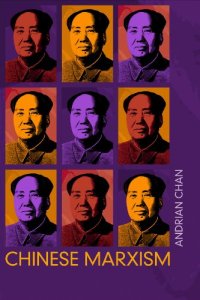
Ebook: Chinese Marxism
Author: Adrian Chan
- Tags: Economics Banks Banking Commerce Commercial Policy Comparative Development Growth Digital Currencies Econometrics Economic Conditions History Environmental Free Enterprise Income Inequality Inflation Interest Labor Industrial Relations Macroeconomics Microeconomics Money Monetary Public Finance Sustainable Theory Unemployment Urban Regional Business Communism Socialism Ideologies Doctrines Politics Government Social Sciences Radicalism Asian International World Political Science New Used Rental
- Year: 2003
- Publisher: Bloomsbury Academic
- Edition: 1
- Language: English
- pdf
This groundbreaking study of Chinese Marxism examines the ideology and praxis of Marxism as it has developed in China from its earliest beginnings to current debates. This is the first systematic, full-length analysis of the development and nature of Marxist ideology in China. Adrian Chan challenges established scholarship in both the West and China, which continues to be overshadowed by Cold War dogma and party orthodoxy, respectively. It has long been argued that Chinese Marxism was merely an offshoot of Soviet thought blended with ill-defined traditional Chinese ideas. Using previously neglected Chinese sources--including newspapers, political journals and communist party documents--Chan refutes this. Showing how the first Chinese revolutionaries were directly influenced by the writings of Marx, Chinese Marxism argues that Bolshevism was a secondary influence on Chinese communist thought. Mao himself drew upon Marxian themes in the creation of party orthodoxy. In doing so he signalled his differences from Lenin and Stalin on important issues of theory and practice.However, not all party leaders accepted this Marxian praxis. This has led to continuous conflict between proponents of Maoist Marxism and Soviet-type scientific Marxism-Leninism. Chinese Marxism presents detailed studies of the Great Leap Forward and the Cultural Revolution to illustrate the consequences of this ongoing ideological conflict, and brings the story up to the present day with an analysis of the current Thermidorean Reaction and the controversial embracing of Confucianism.